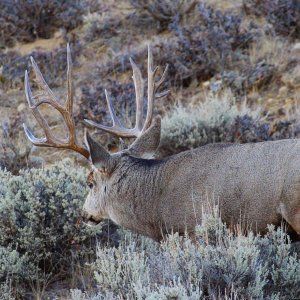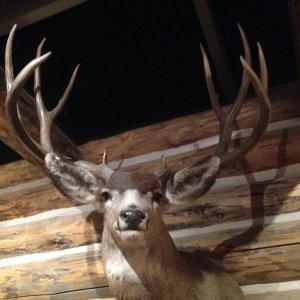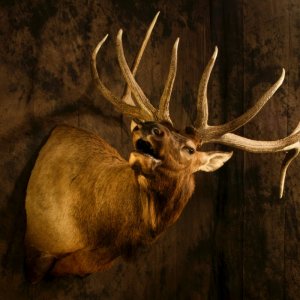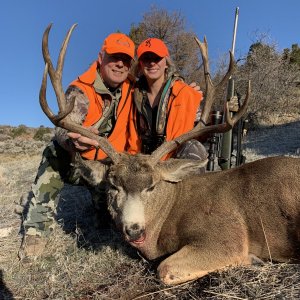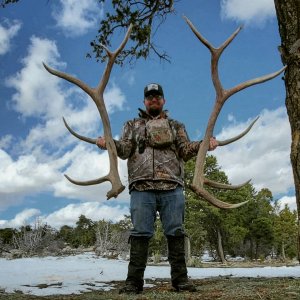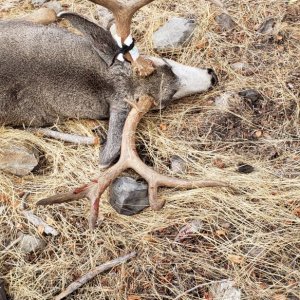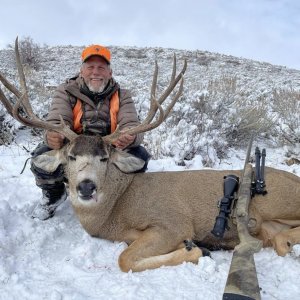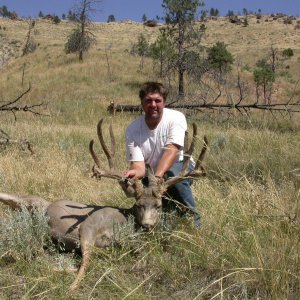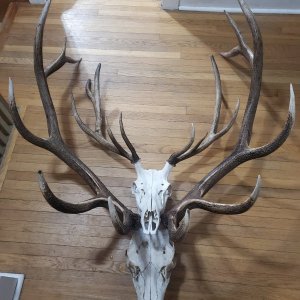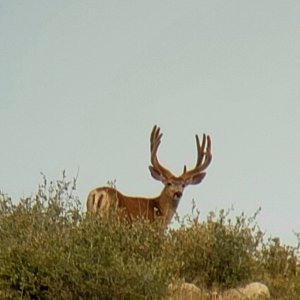What a joke. The district with the most sheep tags, 200, has only two units (203,283)nonresidents can apply for a ram or either sex tag in with a whopping three tags combined. 10% of the district quota should be 7 or 8 tags. There is a good chance not one ram or either sex tag goes to a nonresident in the district. Plus, neither is considered a premier trophy unit. Plus, this will hurt draw odds in other districts. I guess 10% is just asking for too much. Oh well, at least those who do apply in those units are at no disadvantage compared to a resident applying for the same unit.
You are using an out of date browser. It may not display this or other websites correctly.
You should upgrade or use an alternative browser.
You should upgrade or use an alternative browser.
MT NR Units-200 District
- Thread starter ElmerFudd
- Start date
PleaseDear
Long Time Member
- Messages
- 10,609
Made me wonder if there had been some die off or some poaching?? Gotta apply to draw a tag.......
Distribution of the tags has nothing to do with biology, but everything to do with politics. 10% of a smaller quota is fine. Getting locked out of premier units is just wrong. This one will affect NR odds much more than any credit card application process. Look at the nonresident applications for 216, 270, 210 last year. Over half the NR applicants. These will mostly go to other districts. Draw odds are cut in half this year for the better units in other districts for nonresidents.
Any unit not on the nonresident application is "locked out" to nonresidents. True, some premier units are still there, but not in the 200 series. Wishing to have a shot at 10% of the tags is not asking for too much. Get too greedy and the lawyers will be sicked on you too, in fact the USO website says MT and NV are next if AZ loses. I am not wishing for that, but.....
NeMont
Long Time Member
- Messages
- 12,632
LAST EDITED ON Apr-16-04 AT 06:47PM (MST)[p]How is it greed? Wouldn't greed say that we charge more for NR hunts we should make more tags available for NR? I am curious why it is such a big deal to you. There are numerous states with numerous units to apply in.
So USO wants to start in with Montana. Well what do you think your chances of drawing a tag will be then? Have you checked to find out why the tags were cut back?
Nemont
So USO wants to start in with Montana. Well what do you think your chances of drawing a tag will be then? Have you checked to find out why the tags were cut back?
Nemont
LAST EDITED ON Apr-16-04 AT 08:49PM (MST)[p]Greed does not have to be money, in this case, tags. It bothers me more in the method of reducing nonresident opportunity than anything. My chances personally of ever getting a MT sheep tag are slim a percentage of nothing is still nothing, but it still seems just wrong. The 10% cap should be enough. Now, 5% is not even possible in that district, the one with the most tags, and one either sex tag is the most probable number, making it close to 1%. A 10% cap is more like the spirit of the regulation, this just seems to be a backhanded way around it. And I have no affect on what USO does, I just brought it up as something to think about with the bleep the NR attitude you seem to display. Perhaps there is a middle ground. And, how much better are a resident's chances by grabbing up the last 10% of the tags? And, I have been recovering with a broken lower tibia and fibia for over three months now. I probabally will not be able to walk right until summer. Of course, I am in a pissy mood, with lots of time.
M
Montana679
Guest
I believe hunting moose, sheep or goat in Montana should be a once in a lifetime tag, for everyone residents and non residents alike there are residents that have applied for many years and have not drawn a tag and probably never will but if you dont apply you never will. I personally have been applyinf for over twenty five years and never drawn a moose, sheep or goat tag. I dont think greed has anything to do with it I believe the quota is set according to the amount of animals in each area and the male to female ratio.
NeMont
Long Time Member
- Messages
- 12,632
LAST EDITED ON Apr-17-04 AT 03:28PM (MST)[p]Elmer,
First of all you don't know me nor do you know what my attitude is toward NR hunters just FYI I have no bias against NR hunters. Many, Many of my friends from out of state join me in hunting here every year. NR hunters are good for the economy where I live and I generally welcome them. Every year I meet many great people from out of state who I welcome into our State to hunt. I have gone out of my to some members on this board to help them when they came to Montana.
My attitude has more to do with what you stated in your first post. I have been putting in since I was 12 I am now 39 (only missed during the time I was in the Military) and have yet to draw sheep, goat or moose. I don't think it is greed driving the tag numbers. There was no law enacted to reduce NR tag numbers nor was there any effort by resident hunters to deny opportunities to NR.
Sorry about your leg hope it heals up quickly and you get up and about as soon as possible.
Nemont
First of all you don't know me nor do you know what my attitude is toward NR hunters just FYI I have no bias against NR hunters. Many, Many of my friends from out of state join me in hunting here every year. NR hunters are good for the economy where I live and I generally welcome them. Every year I meet many great people from out of state who I welcome into our State to hunt. I have gone out of my to some members on this board to help them when they came to Montana.
My attitude has more to do with what you stated in your first post. I have been putting in since I was 12 I am now 39 (only missed during the time I was in the Military) and have yet to draw sheep, goat or moose. I don't think it is greed driving the tag numbers. There was no law enacted to reduce NR tag numbers nor was there any effort by resident hunters to deny opportunities to NR.
Sorry about your leg hope it heals up quickly and you get up and about as soon as possible.
Nemont
You are right, I judged too quickly. It really stinks that most hunters will never get a tag for those species, demand is much greater than supply. Anyway, I just sent in my MT application and will hope for the best. I made it most of the day at work without crutches today, so although I will not be in great shape by hunting season, I think it is in the cards now. A couple of months ago, it was in doubt.
Lets get everyone mad at me. My beef with NV is that you are forced to buy the useless license to get points, and the application fees are pretty high. It is about $250 for a nonresident every year just to stay in and cover the field. Plus, $1200 for an elk tag? All in a state that has no personal income tax. I know we do not have to, but... I think USO wants too much, but then again there has to be some middle ground.
NVBighorn
Long Time Member
- Messages
- 9,458
I'm not mad at you. I'm mad at USO. I agree with you that there has to be middle ground. 10% for non-residents is middle ground. I understand what you're saying about the Montana districts. But, the way I look at it is it's their state. The State is responsible for the management of the wildlife. The federal government is not. Nor should they be if you look at the wackos we have in DC. I should not have the same chances or priviledges in every state in the US just because I am a citizen of the US. I sure as hell don't want someone from another state dictating to me how to live, what I hunt or what taxes I will pay or what they will be spent on. If we give them the same rights in the tag draws why not everything else? Make this one happy socialist country. Everybody for everybody. Not! If I want to have the same priviledges as a resident I will move to that state. But then I won't have the same priviledges as a resident where I move from. So I have to make achoice. And if you look at the economy of some of the western states you will see why it's not feasible to move there.
As for Nevada and the "useless" license you have to buy. I just bought an equally "useless" license in Idaho and am sending off the application for a "useless" license in Oregon. But the difference between that and the "useless" license in Nevada is I don't build any bonus points for sheep in Idaho or Oregon. But that's my choice. It's a game I am willing to play. Every state is different in how the game is played but I am free to make my choice which game I play in.
And as for Nevada not having a state income tax, what does that have to do with anything? The amount of money the Nv Dept of Wildlife gets from the general coffers is negligible. On the order of less than 3% of it's budget which is spent on non-game and education. The sportsmen are footing the bill for wildlife in Nevada. Period. And I like it that way. I don't want some bunny hugging senator or representative from Las Vegas telling me what and where I can hunt because they feel they can because they are helping to fund the program.
And if you think USO gives one tiny hair off a rat's a$$ about you as a non-resident you are dreaming. The USO initiative is about money. Period. And it will hurt you and I if they are allowed to continue their move.
Sorry if I come off strong to you. I mean no offense. Just airing my opinion.
Rant over.
As for Nevada and the "useless" license you have to buy. I just bought an equally "useless" license in Idaho and am sending off the application for a "useless" license in Oregon. But the difference between that and the "useless" license in Nevada is I don't build any bonus points for sheep in Idaho or Oregon. But that's my choice. It's a game I am willing to play. Every state is different in how the game is played but I am free to make my choice which game I play in.
And as for Nevada not having a state income tax, what does that have to do with anything? The amount of money the Nv Dept of Wildlife gets from the general coffers is negligible. On the order of less than 3% of it's budget which is spent on non-game and education. The sportsmen are footing the bill for wildlife in Nevada. Period. And I like it that way. I don't want some bunny hugging senator or representative from Las Vegas telling me what and where I can hunt because they feel they can because they are helping to fund the program.
And if you think USO gives one tiny hair off a rat's a$$ about you as a non-resident you are dreaming. The USO initiative is about money. Period. And it will hurt you and I if they are allowed to continue their move.
Sorry if I come off strong to you. I mean no offense. Just airing my opinion.
Rant over.
None taken. My point was just be a bit reasonable for prices and tag allocation, like 10% to 20%, and perhaps 5:1 for prices, and I bet nobody would ever bring up or support a lawsuit. The whole thing could have been avoided entirely. Now, there is risk of getting the feds into everything. Odds are that AZ will lose, I guess it is too late now. Actually, AZ is pretty reasonable for nonresident prices in comparison to NV, plus you can do archery deer OTC and have a good shot at javelina and turkey. You can use the ID license for pretty good OTC elk and deer, and your shot of drawing a sheep tag is pretty good in comparison to NR draw odds in NV. I thought one of the excuses for charging so much for nonresident tags is that the resident already pays enough income tax.
Just to heat things up a little, some people would argue that there is an injustice when a state with a large portion of land owned by the federal government allocates 90% of hunting tags to residents and only 10% to non-residents. How would circumstances change if the rules were changed wherein the federal government changed the rules and decided to manage the wildlife on its own lands and allocate hunting licenses to state citizens based on the populations of states? This would not impact non-federally owned lands, but federally owned lands would be ruled accordingly.
I'm not saying this is what ought to be done or that this is what I advocate. I'm just recommending it as food for thought. It provides some insight into a part of the non-resident's view point. Not all of the viewpoint, but some. I think the guy who started this thread wasn't too excited about being constrained to 10%, but could live with it. When what he perceived as games started being played with how this 10% is calculated, he felt abused. And being abused the argument about "whose land is it anyway?" immediately comes to mind.
Continuing on this theme, who owns the Bob Marshall Wilderness? Montana or the US government? If the US government, why should Montana allocate 90% of tags to Montana residents? Why not allocate 10% to Texas because Texas has 10% of US population, 15% to California because California has 15% of US population, 20% to New York because New York has 20% of US population, and .5% to Montana because Montana has .5% of US population. This would roughly even up the odds of any US citizen to draw a tag to hunt on these lands which are supposed to be a common US property in which we should all share equally. These numbers are arbitrary and may not be very exact, but you get the idea. This same analysis could be applied to the other federal lands.
Just food for thought.
Personally, I don't apply for permits with low odds of drawing such as moose, sheep, and goat. I'll apply for pronghorn permits in Wyoming and Cow Elk permits in Colorado. I don't consider myself a trophy hunter, but someone who hunts for the joy of hunting and for the wonderful wild game meat. It takes all kinds, and I don't begrudge the trophy hunters their passion.
I'm not saying this is what ought to be done or that this is what I advocate. I'm just recommending it as food for thought. It provides some insight into a part of the non-resident's view point. Not all of the viewpoint, but some. I think the guy who started this thread wasn't too excited about being constrained to 10%, but could live with it. When what he perceived as games started being played with how this 10% is calculated, he felt abused. And being abused the argument about "whose land is it anyway?" immediately comes to mind.
Continuing on this theme, who owns the Bob Marshall Wilderness? Montana or the US government? If the US government, why should Montana allocate 90% of tags to Montana residents? Why not allocate 10% to Texas because Texas has 10% of US population, 15% to California because California has 15% of US population, 20% to New York because New York has 20% of US population, and .5% to Montana because Montana has .5% of US population. This would roughly even up the odds of any US citizen to draw a tag to hunt on these lands which are supposed to be a common US property in which we should all share equally. These numbers are arbitrary and may not be very exact, but you get the idea. This same analysis could be applied to the other federal lands.
Just food for thought.
Personally, I don't apply for permits with low odds of drawing such as moose, sheep, and goat. I'll apply for pronghorn permits in Wyoming and Cow Elk permits in Colorado. I don't consider myself a trophy hunter, but someone who hunts for the joy of hunting and for the wonderful wild game meat. It takes all kinds, and I don't begrudge the trophy hunters their passion.
NeMont
Long Time Member
- Messages
- 12,632
Because each state claims ownership of the animals. Really has nothing to do with who owns the land. If that were the case then every private ranch could sell their own tags because the hunting takes place on their land.
I think if that system was adopted you would find that resident hunters in any state would be up in arms. Elmerfudd was put out by what he sees as unfair allocation of tags. That is his right my point is that it is no cake walk or guarantee for residents either.
Nemont
I think if that system was adopted you would find that resident hunters in any state would be up in arms. Elmerfudd was put out by what he sees as unfair allocation of tags. That is his right my point is that it is no cake walk or guarantee for residents either.
Nemont
I'm not taking any position on it. I'm not advocating changing the existing system. My response to low odds is to play a different game. For me there is good hunting in other species which are not so limited as sheep, goats, and the like.
It seems that hunting is in safer hands when governed by states with abundant hunting opportunities -- Montana, Wyoming, Colorado, etc., -- then if control were placed in federal hands where many non-hunters in lands remote from the federal lands in question would have a vote in what goes on. In the changed situation, the preponderance of non-hunters in the US might just outlaw hunting on federal lands: not a good scenario.
It seems that hunting is in safer hands when governed by states with abundant hunting opportunities -- Montana, Wyoming, Colorado, etc., -- then if control were placed in federal hands where many non-hunters in lands remote from the federal lands in question would have a vote in what goes on. In the changed situation, the preponderance of non-hunters in the US might just outlaw hunting on federal lands: not a good scenario.
Similar threads
- Replies
- 1
- Views
- 1k

